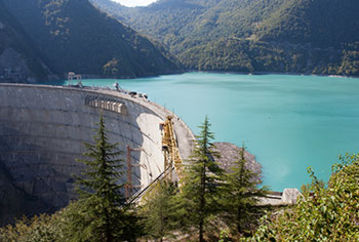- Current situation
- Political framework
- Key areas of cooperation
- Cooperation in the context of EU projects
Current situation
In response to the Russian attack on Ukraine, which violated international law, the German Federal Ministry of Education and Research (BMBF) announced a fundamental change in its cooperation policy with Russia in a statment on 25 February 2022. The website has since been updated:
Information on suspending the cooperation with Russia and Belarus
For open funding opportunities with Armenia, Azerbaijan, Georgia, the Republic of Moldova, and Ukarine go to Current Announcements.
Political framework
Cooperation with the Eastern Partnership countries Armenia, Azerbaijan, Georgia, and the Republic of Moldova in the field of research policy is of exceptional importance to Germany in the search for solutions to the global challenges of the 21st century. The political framework is based on interlinked strategies at both European and national level to intensify cooperation.
- The Eastern Partnership is intensifying relations between the EU and its strategically important near neighbours – which are located between the East and West but look towards the EU on many issues – and putting them on a new basis. The resulting strengthening of these regions and their links to the West, especially in research and education, are goals shared by Germany and the European Neighbourhood Policy.
- The Federal Government defined policy guidelines for a stronger involvement in developing and emerging countries in the areas of education and research in its Strategy for the Internationalization of Science and Research, adopted in 2008; these guidelines are also embedded in the current government coalition agreement. The countries concerned include those in the South Caucasus region (Armenia, Azerbaijan and Georgia).
- The central basis of the scientific cooperation between Germany and the region is an intergovernmental agreement on science and technology cooperation with the former Soviet Union, which took effect in 1987 and is still considered valid by the successor states. Separate bilateral agreements have since been signed with individual countries (e.g. Moldova in 2008, Armenia in 2011).
- In spring 2016, the South Caucasian countries of Armenia and Georgia each concluded an agreement of association with the EU Framework Programme for Research and Innovation 'Horizon 2020'. This means that the research institutions, universities and individual researchers in both countries now have unlimited access to the opportunities offered by 'Horizon 2020' in various areas and at all levels from basic research to demonstration. Moreover, they are now on an equal footing with scientists and institutions in the EU member states and other countries associated with the programme.
Key areas of cooperation
Many of the Eastern Partnership countries offer attractive conditions for cooperation. They provide excellent research expertise and in some cases attractive research infrastructures as well as well-trained, gifted young scientists. This potential could be harnessed in research partnerships with Germany that would benefit all those involved.
Since 2008, the Ministry has been supporting smaller research cooperation projects with CIS countries (including the Eastern Partnership countries) with regular calls for proposals in science and technology cooperation (STC). This funding, open to any topic, covers exchanges of experts and young scientists as well as workshops with partners in the region. The projects funded by the BMBF address regional needs such as improvements in agricultural production, integrated nature conservation planning or monitoring changes to the landscape.
The agreements and declarations of intent were brought to life by the publication in autumn 2012 of bilateral STC calls for proposals coordinated with Armenia and Moldova relating to the joint support of project-related mobility, meetings of experts and thematic project planning workshops. The projects funded cover an exceptionally wide range of research areas, from health and nutrition, energy and climate to communication and key technologies. A third bilateral STC funding announcement with Armenia was published in spring 2021. A current bilateral funding announcement for mobility funding with the Republic of Moldova was published in January 2024.
The BMBF regularly publishes calls for proposals to 'promote partnerships for sustainable solutions to problems in developing and emerging countries' under the title 'Research for Development'. A fourth funding announcement of this type was published in August 2019.
Cooperation in the context of EU projects
The Federal Ministry of Research and Education’s bilateral research partnerships were supported by the EU project EaP PLUS (2016-2019). The aim was to enhance the political dialogue between the countries of the EU and the Eastern Partnership in research and development and to facilitate access to the European Research Area for researchers from the region.
The BMBF was also involved in the EU projects Black Sea Horizon and RI-LINKS2UA ('Strengthening Research and Innovation Links towards Ukraine') .
Last but not least, the Ministry's commitment at European level is expressed by its participation in the EU Commission's 'Eastern Partnership Panel on Research and Innovation' (EaP Panel).








